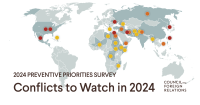Geopolitics, the intricate interplay of geography, power, and international relations, shapes the global landscape in profound ways. As nations jockey for influence, resources, and security, understanding the nuances of geopolitics becomes essential. In this blog, we'll unravel the complexities of geopolitics and explore its impact on the world stage.

1. Definition and Scope of Geopolitics:
Geopolitics refers to the study of how geography influences political power and international relations. It encompasses a broad range of factors, including geographical location, natural resources, military capabilities, and historical relationships between nations. Geopolitical analysis helps us comprehend the motivations and strategies of states in the global arena.
2. Power Dynamics and Global Players:
The world is characterized by a dynamic power structure where certain nations wield considerable influence. Superpowers like the United States, China, and Russia, along with regional powers, play pivotal roles in shaping geopolitical events. Understanding the motivations and actions of these key players is crucial for interpreting global developments.
3. Geopolitical Hotspots:
Certain regions are geopolitical hotspots, where tensions and conflicts often arise due to historical grievances, territorial disputes, or competition for resources. Examples include the South China Sea, the Korean Peninsula, the Middle East, and Eastern Europe. These areas are focal points for international relations and often command significant attention from global policymakers.
4. Economic Geopolitics:
Economic factors are central to geopolitics. Nations compete for access to markets, resources, and strategic infrastructure. Trade agreements, economic sanctions, and investment decisions are all tools wielded by states to advance their economic interests and exert influence on the global stage.
5. Technological Advancements and Cybersecurity:
The digital age has introduced new dimensions to geopolitics. Cybersecurity and technological advancements have become critical elements in the strategic toolkit of nations. The race for dominance in emerging technologies, such as artificial intelligence and quantum computing, adds another layer to geopolitical competition.
6. Environmental Geopolitics:
As climate change accelerates, environmental factors are increasingly shaping geopolitical dynamics. Issues such as access to natural resources, control over waterways, and the impact of climate-related events on vulnerable regions are becoming key considerations for policymakers worldwide.

7. International Organizations and Alliances:
Global governance is influenced by international organizations and alliances that aim to foster cooperation and address common challenges. Entities like the United Nations, NATO, and regional alliances play roles in mediating conflicts, coordinating responses to crises, and promoting diplomatic solutions to geopolitical issues.
8. Soft Power and Cultural Diplomacy:
Beyond military and economic might, soft power and cultural diplomacy are crucial aspects of geopolitics. The ability to influence through cultural exports, education, and diplomacy can shape perceptions and build international alliances.
9. The Role of Non-State Actors:
Geopolitics is not solely the domain of nation-states. Non-state actors, including multinational corporations, non-governmental organizations (NGOs), and transnational criminal networks, also exert influence and play significant roles in shaping global affairs.
10. The Future of Geopolitics:
Looking ahead, geopolitical dynamics are likely to evolve with emerging challenges such as pandemics, cybersecurity threats, and shifts in economic power. Navigating this complex terrain requires a nuanced understanding of the interconnected forces that drive international relations.
In conclusion, geopolitics is a multifaceted and ever-changing field that influences the course of nations and the trajectory of global events. By delving into the intricacies of geopolitical dynamics, we gain insights into the motivations, challenges, and opportunities that define the international landscape. As the world continues to evolve, a deep understanding of geopolitics becomes an indispensable tool for informed decision-making and global citizenship.







